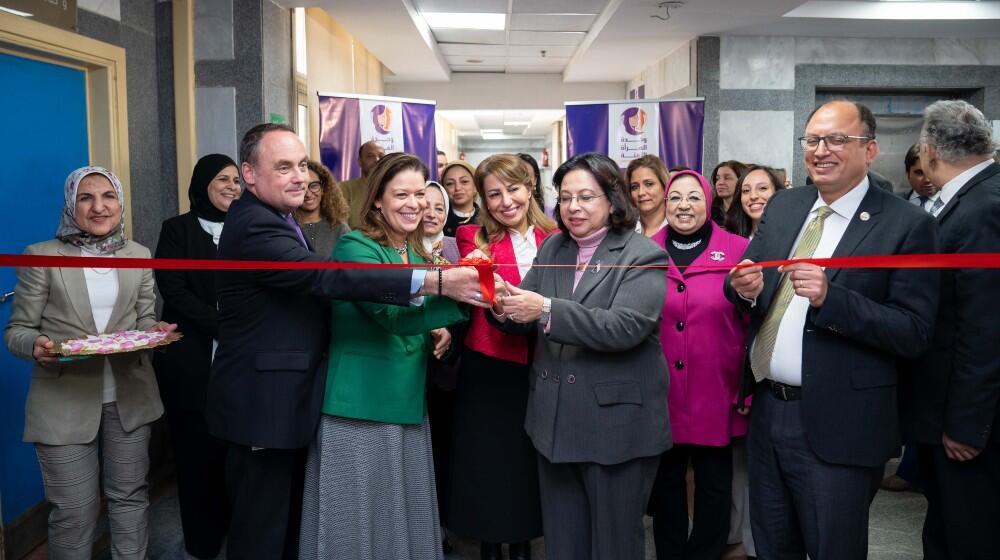As part of their joint efforts to combat violence against women and girls and improve healthcare services for survivors across Egypt, the National Council for Women (NCW), the U.S. government, the United Nations Population Fund (UNFPA) and Helwan University Hospital inaugurated a new Safe Women Clinic at the hospital on December 19, 2024.
Inauguration attendees included Dr. El-Sayed Kandil, President of Helwan University; Ms. Evyenia Sidereas, U.S. Embassy Chargé d’Affaires; Mr. Yves Sassenrath, UNFPA Representative in Egypt; Dr. Rasha Rifai, Dean of the Faculty of Medicine in Helwan University; and Dr. Salma Dwara, Representative from NCW; as well as senior department heads and medical experts from the university hospital. Attendees toured the clinic with Dr. Marwa Ghanem, Director of the Helwan Safe Women Clinic, who explained the services offered.
The Helwan University clinic brings the total number of Safe Women Clinics to 48 clinics established to-date - 20 of which in different university hospitals around Egypt established in partnership with the National Council for Women, and 28 under the Ministry of Health and Population at the Primary Health Care. The United States Agency for International Development (USAID) funded the Helwan Clinic and a second one in Port Said.
The clinics provide comprehensive medical, psychosocial, legal, and social support services. The clinics also facilitate direct referrals for women and girls subjected to violence to the Women’s Complaints Office, using Egypt’s national referral pathway. Since their establishment began in 2019, the clinics have become a vital service delivery channel and an entry point for thousands of women annually.
“Violence against women and girls is a challenge in Egypt, in the United States, and around the world. The Egyptian government has prioritized this issue, and we stand with you in supporting national strategies to prevent and respond to all forms of violence against women and girls,” Sidereas said.
“The first point of contact for women and girls who have been subjected to violence is often a health service provider, that is why this clinic is another milestone in our joint work to combat gender-based violence against women and girls and provide prevention and protection from all forms of violence,” Sassenrath said.
On her part, Dr. Dwara stressed that violence against women is a violation of human rights and stands in the way of sustainable development. She added that the Helwan Safe Women Clinic comes to confirm the commitment to providing a safe and supportive environment for women and girls.
UNFPA and the National Council for Women hold regular training workshops for doctors and nurses on medical response guidelines to cases of violence against women, to strengthen their knowledge on the most prevalent forms of violence against women and girls, the available services, the relevant legislation, the updated medical and clinical procedures and the referral mechanism to the legal and social services.
In November 2024, UNFPA and the National Council for Women launched the first Procedural Guidelines to Establish Medical Response Clinics for Victims of GBV.
The Helwan clinic is one component of U.S. government support to UNFPA and NCW to advance Egypt’s National Strategy for the Empowerment of Egyptian Women 2030. These efforts build on and expand local-level services and community-based interventions to promote zero tolerance for all forms of violence against women.




